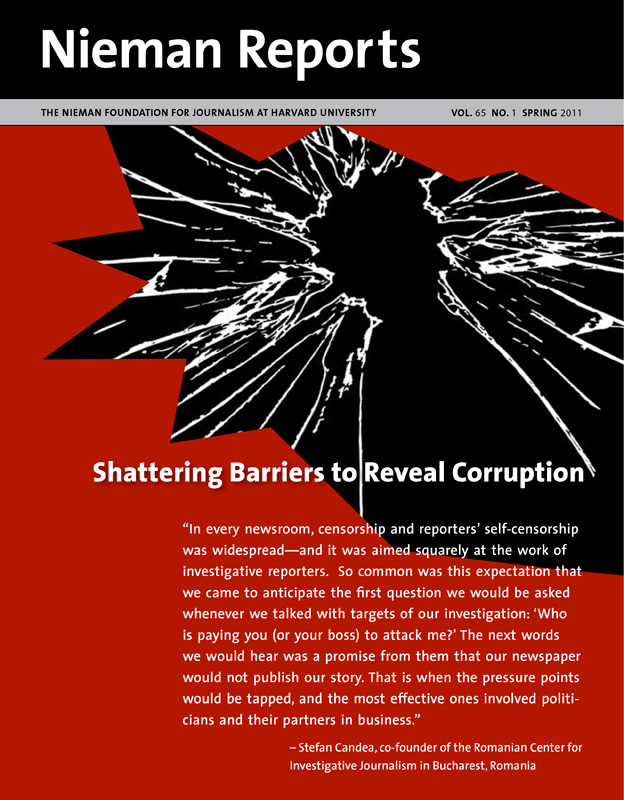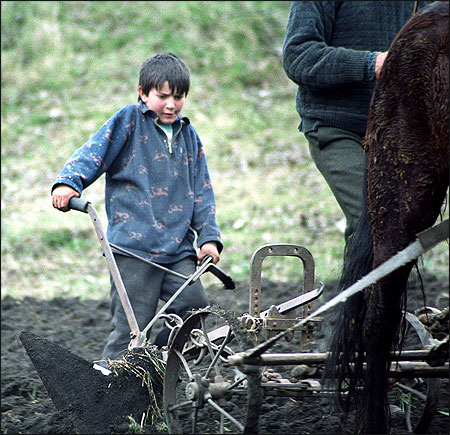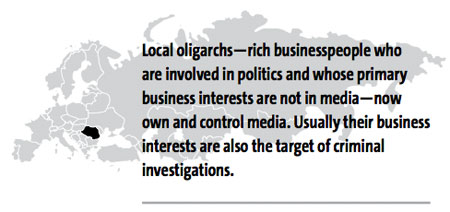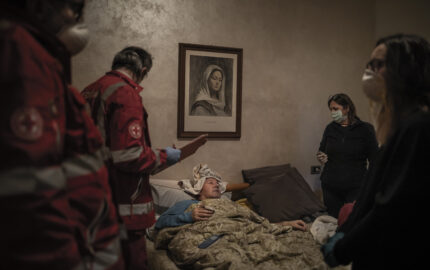
RELATED ARTICLE
“Sorin Ovidiu Vintu: Buying Propaganda as News”
- Stefan Candea
The elite's most valued asset is its control over information. It is not coincidental that most of the public still doesn't know the names of many of the 15,000 agents and 400,000 informants from the time when President Nicolae Ceausescu ruled this country with an iron fist. And the elite—most of all older journalists and politicians—profoundly dislike independent journalists, and especially nosey ones.
While I was writing these words, I kept being pulled back to an evening last November when I attended the Committee to Protect Journalists (CPJ) awards ceremony in New York City. On this night journalists gathered to celebrate the courage, persistence and determination of those who report the news despite being arrested, kidnapped, shot at, and sometimes killed.RELATED ARTICLE
“Establishing the Romanian Center for Investigative Journalism ”
- Stefan Candea (In 2010, 44 journalists were killed while doing their jobs, according to CPJ.) In my mind's eye, I replayed clip after clip of video I had seen there about reporters who took great risks to expose corruption and abuses of power or tell the world about those who are victims of terrible oppression. Their efforts reminded me of why such journalists deserve our trust, respect and recognition.
At the same time, I flashed back to Romania. Now I was wondering why any sane person would invest trust and respect in most of the journalists who work there. Their main product is propaganda and their primary talent is withholding the truth.

The Romanian Center for Investigative Journalism—co-founded by Stefan Candea and three fellow reporters—reported in 2004 on forced labor, prostitution and other crimes against children in Romania and Moldova. Photo by Mihai Vasile/RCIJ.
Here is a situation (one of many I know about) that exemplifies what "investigative journalism" looks like in Romania today: About a year ago, two RELATED LINK
The Romanian Center for Investigative Journalismwell-known "senior" journalists were caught on tape trying to blackmail the head of the country's National Agency for Integrity, which is the governmental agency charged with investigating the wealth of public officials. One of the journalists did not ask for money; he can be heard explaining that he's in a "different league" of journalists so $70,000 means nothing to him. But during the taped conversation he threatened to publish compromising information about that state clerk and mentioned withholding that information if, in return, he would be given compromising information about the president and his political entourage. After his words were leaked to the media, the journalist said that this was not blackmail; it was investigative journalism at work.
Indeed, the so-called investigative journalism in Romania was for years a cover for blackmail, advertisement racketeering, and disinformation campaigns. Some journalists or media outlets still use this kind of approach to "sources" as a way of making good money. Not surprisingly, the owners of some of these media outlets are organized crime groups.
The Industry as Enemy
RELATED LINK
Resources for Investigative ReportersDuring the early years of Romania's transition from Communism to democracy, media owners were either well-connected business entrepreneurs or former journalists who had worked within the Communist propaganda machine. They transferred their competencies and the rules from their previous professions into these new ones. Of course, those skills had nothing to do with quality journalism or its foundational ethics. But when these reporters became financially successful (profiting through their unethical practices), they unfortunately became the models for generations of young journalists to follow.
When I set out to do investigative stories as a journalist, my work focused on organized crime. This put me into all kinds of threatening—and potentially compromising—situations: There were bribery attempts and surveillance, and other media attacked my stories and me. Lawsuits and court trials were used to try to weaken my resolve, and I received death threats. I could live with all of this. For me, what was most disturbing was the corruption and censorship I found in my newsroom, where the editors and management came from this aforementioned generation of older journalists. I would find colleagues stealing and selling photos I had obtained during a stakeout; others tried to leak articles to the target of my investigation before the print button was hit.
Then there were the bosses themselves—those who owned the media. I started doing investigative journalism 12 years ago in the newsroom of a leading national daily paper in Bucharest. The paper was co-owned by a well-known German media group. That fact didn't help me in my daily work; what mattered was that the co-owner was an old school Romanian journalist. He was involved in publishing the paper, writing daily editorials, deciding on the editorial content, and signing advertising contracts. And because of him being in the center of these conflicting positions the investigative stories I did were sometimes not published. Or they were published in a censored form. Or, in the worst cases, they produced under-the-table benefits for this owner.
When such episodes became too frequent—and too absurd—several of my colleagues and I left the paper. Now our dilemma became where we would go to publish our stories. Nearly every Romanian newspaper owner had this same background and perspective. In fact, they were organized in a cartel nicely named the Romanian Press Club. And in every newsroom, censorship (and reporters' self-censorship) was widespread—and it was aimed squarely at the work of investigative reporters.
So common was this expectation that we came to anticipate the first question we would be asked whenever we talked with targets of our investigation: "Who is paying you (or your boss) to attack me?" The next words we would hear was a promise from them that our newspaper would not publish our story. That is when the pressure points would be tapped, and the most effective ones involved politicians and their partners in business.

Building From Scratch
Looking back at my early years, all of what I learned working in a newsroom was how not to do journalism. Some of the genuine investigative skills that I acquired came from international workshops, seminars and conferences I attended. Of greatest value has been hands-on training from working with Western colleagues. But no skills or approach could be directly imported to my work in Romania; I had to adjust them to the reality in my region.
In a newsroom in the United States or Western Europe, reporters have access to a wide range of information, some of it in the form of databases, and they also have some confidence that those who hold government jobs are doing what they are said to be doing. Freedom of Information Act (FOIA) requests usually do work eventually. Contrast this with reporters in Romania who must build databases from scratch by extracting information from a range of documents, and those can be quite difficult to get. Assumptions about what the data might yield must be formulated and tested by the reporter since it is rare that anyone else has conducted a similar investigation on this matter. In the best-case scenario, an official investigation starts after we publish.
Such circumstances explain why we sometimes have to start our investigations using undercover techniques and continue them with traditional reporting techniques. In a country subsumed for five decades under the deep secrecy of Communism, attempts to use our nation's laws are nightmarish. Reporters usually have to go to court to enforce a freedom of information request—and the legal process can take up to five years. Finding competent government workers who are not corrupt is the rare exception so investigative reporting cannot start there. All of this makes our efforts relevant only after years of finding the necessary software, building particular databases, and looking for additional resources. And we are not necessarily able to build our network of sources while this is happening.
As we struggle to obtain information and find a way to publish it, the form that the story will take is the last thing we can worry about. But how to package investigative articles is very important so we keep a watchful eye on the foreign news media and see how they experiment with multimedia publishing.
That's also the reason why we immediately brought onboard a group of independent photojournalists. We welcomed them to take part on major projects, such as undercover research in the separatist republic of Trans-Dniester and an investigation in 2004 into enslavement and other crimes against children.
A Broken Mainstream Media
During the past two decades, millions of dollars in foreign media assistance have poured into Romania but without much noticeable positive effect on the quality of its journalism. What one must conclude is that we have a broken media industry, and the economic pressures bearing down on media have become even more burdensome. This means that investigative journalism must find ways to develop outside the mainstream of this industry.
During the past five years, owners like my former boss, who had been a journalist, have sold their shares in the business. Local oligarchs—rich businesspeople who are involved in politics and whose primary business interests are not in media—now own and control media. Usually their business interests are also the target of criminal investigations. The reason that they invest in money-losing media corporations is to gain leverage to negotiate with politicians to keep themselves out of jail. They run their media companies as they would a military operation, and like their predecessors, they, too, profoundly dislike independent and nosey journalists.
Here and there it is possible to find good journalists who are isolated in a newsroom. Gather them together and their numbers might add up to enough to build a competent, strong and honest newsroom. But then who would pay for that?
These local oligarchs lack any dimension of ethics, discourage competition, and don't adhere to a meritocracy. Why should they adhere to any standards of journalism? After all, their only need is to hire people to produce propaganda and send out the continuing onslaught of infotainment, business and political manipulation, live press conferences as breaking news, and copy-and-paste journalism. A lot of these so-called journalists use their media work as a trampoline propelling them into governmental positions, including foreign diplomacy, or into jobs with a political party or corporation. Their dream is to become part of the establishment.
In recent times, direct political pressure on the news media diminished as Romania climbed its way into the European Union. What is worrying now are the frequent attempts by members of Parliament to sneak in ridiculous pieces of legislation that would put a leash on journalists. Among the recent draft laws were these proposals:
- Force TV stations to broadcast 50 percent positive news and 50 percent negative news
- Put the print media under the jurisdiction of the National Audiovisual Council
- Censor the comments for all news websites.
The only reason such laws have not passed is that we have strong nongovernmental organizations that act as legislative watchdogs. However, the recent national defense strategy identifies the media as being "a vulnerability" for "national security." These days, as soon as politicians assume power, they, too, start to profoundly dislike independent and nosey journalists.
But independent and nosey journalists aren't going away—and finding support for their investigative work in Romania is why a decade ago I co-founded the Romanian Center for Investigative Journalism. It stands as a testament to the dedication of a few—and hopefully the inspiration for many—to not give in to the pressures bearing down on journalists who dare to tell the stories that a democratic people deserve to hear.
Stefan Candea, a 2011 Nieman Fellow, is a freelance journalist and co-founder of the Romanian Center for Investigative Journalism in Bucharest, Romania. He teaches investigative journalism at Bucharest University, and he is a member of the International Consortium of Investigative Journalists and a correspondent for Reporters sans Frontieres in Romania.


